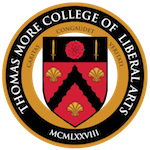
The Thomas More College of Liberal Arts
Six Manchester Street
Merrimack, NH 03054
Phone: (603) 880-8308
Fax: (603) 880-9280
Contact via email
Copyright © 2024 Thomas More College of Liberal Arts. All rights reserved.
The curriculum of the Western Pilgrimage is designed to fit the journey in order that students may learn to see more deeply into the natural order around them. Studying in rugged terrain and moving the discussions and classes across such a dramatic landscape will give participants a concrete vision of the ideas of the Western tradition—ideas that they will encounter in their studies, and which will shape their lives.
Natural Science 200/300
This course develops the students’ wonder and knowledge of the natural world through extensive field study of all the major habitats of the American West. Students will learn to identify the principal trees and vegetation, as well as the common birds and mammals of the area stretching from Glacier National Park to the High Plains of New Mexico. Understanding the causes of weather patterns and habitat formation and change will also be woven into the daily assignments. The common text is the Audubon Field Guide for the Western States in addition to generous readings from the great explorers and naturalists of the West, including Audubon, Muir, Roosevelt, Leopold, and Abbey.
Literature 200/300
Why are humans attracted to journeys, adventures, even danger? Are challenges always likely to bring out the best in us? What is the relationship between experience and character? This course allows the students to consider these questions and the theme of the quest in the Western tradition as they reflect on their own passage across the Western landscape. Readings are drawn from such canonical texts as Sir Gawain and the Green Knight and Owen Wister’s The Virginian, as well as short reflections by modern writers such as L’Amour and Stegner.
Politics 200/300
How does one make the transition from a vision of a leader (in literature, for example) to developing the traits of a leader? What made the men of the West worthy of admiration in terms of skills, habits of thought, and resilience? Readings will be drawn from Lewis and Clark, Parkman, and Roosevelt, as well as the practical insights of contemporary authorities such as Ward and Harvey. Field work will include practical testing of the aspirational vision offered by literary authors against every changing challenge of the frontier.
Philosophy 200/300
Every person is called to reflect upon the dignity of their own life as well as those of others. How does one assess human actions? What are the principles of good human actions? What is the role of friendship in an individual quest for happiness, and what is happiness? This class examines the classic methodology found in the works of Epictetus and the summation of Aristotelian and Christian virtue ethics distilled by Guardini.
Theology 200/300
Alongside reading Cather’s Death Comes for the Archbishop, students will consider the place of the wilderness in the formation of Catholic theology and prayer. The course will involve a careful and active study of the shorter versions of the Liturgy of the Hours as well as devotions maintained by the Catholic communities of the American Southwest.

The Thomas More College of Liberal Arts
Six Manchester Street
Merrimack, NH 03054
Phone: (603) 880-8308
Fax: (603) 880-9280
Contact via email
Copyright © 2024 Thomas More College of Liberal Arts. All rights reserved.